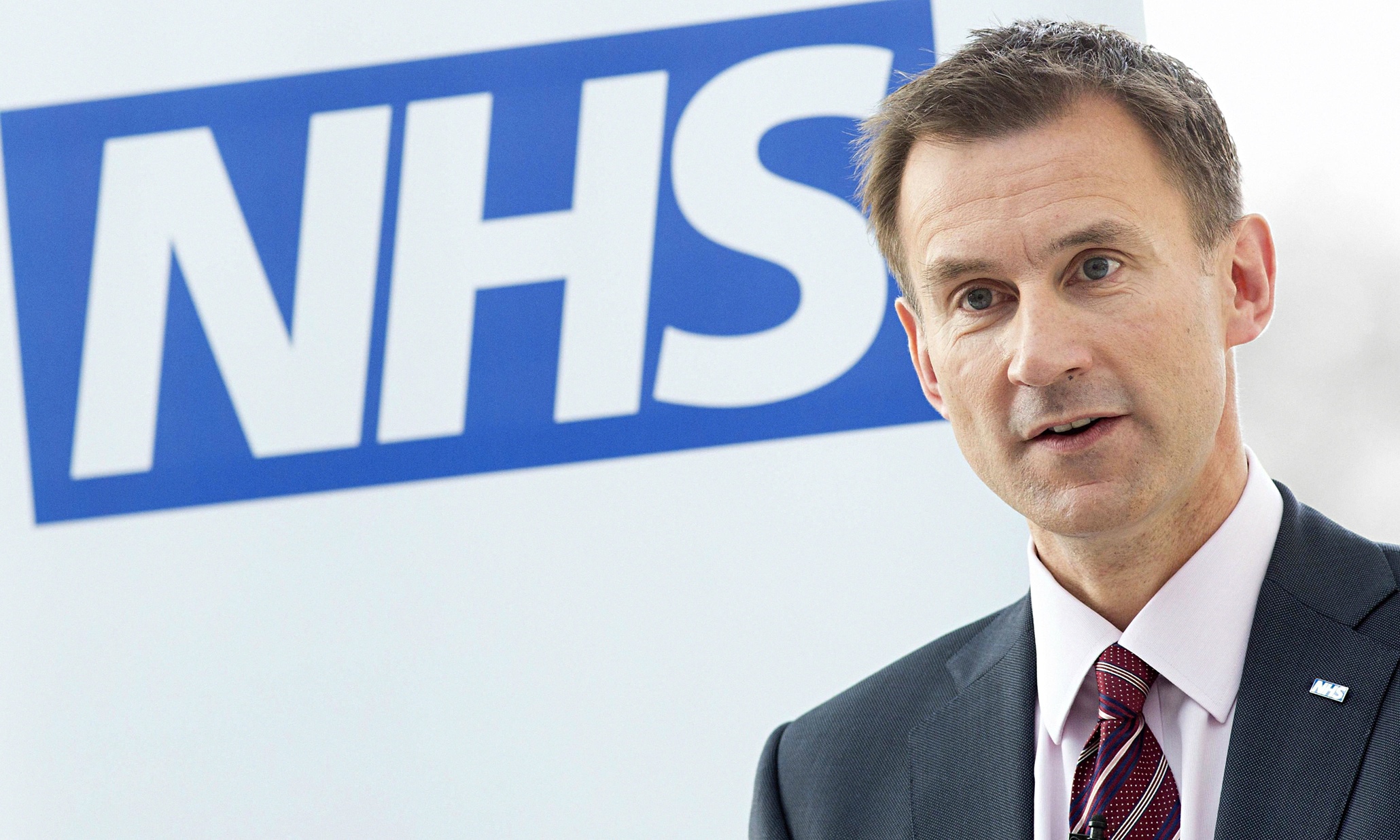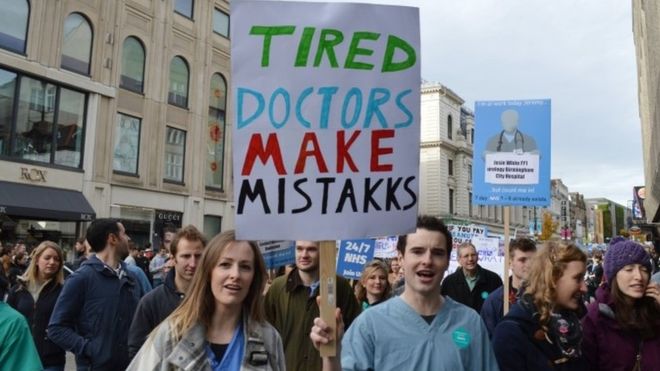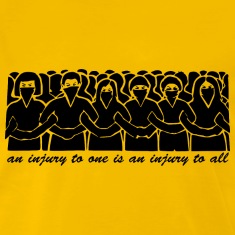A few months ago I wrote a blog suggesting the right approach for the junior doctors was one of subversion and submission. But I think I was wrong. It’s not that I’ve changed my mind on the power of subversion and submission, it’s just that this entire spectacle surrounding the junior doctors, the ‘7 day NHS’, the strikes and the media reporting there of actually affects us all at a profound level.
 This situation exposes something far deeper than just an argument between Jeremy Hunt and the BMA and is far more important than discovering who has the strongest will power. Infact, the BMA have made a major error in targeting Jeremy Hunt so vindictively, because in the final analysis, this isn’t about Hunt at all. Jeremy Hunt can be replaced in a moment, and is likely to be succeeded by a far more robust
This situation exposes something far deeper than just an argument between Jeremy Hunt and the BMA and is far more important than discovering who has the strongest will power. Infact, the BMA have made a major error in targeting Jeremy Hunt so vindictively, because in the final analysis, this isn’t about Hunt at all. Jeremy Hunt can be replaced in a moment, and is likely to be succeeded by a far more robust  Boris Johnson, who will simply pound his fist more visciously. To make Hunt the scape goat narrows this debate to something far too insignificant and actually strengthens the government’s ability to do exactly as they please.
Boris Johnson, who will simply pound his fist more visciously. To make Hunt the scape goat narrows this debate to something far too insignificant and actually strengthens the government’s ability to do exactly as they please.
Sadly, however, all this proves is how defunct our current system of government has always been. What the government really want is a discussion about how we can improve patient access across the weekend timeframe. However, what they did was to decide this is necessary and went ahead to try to fix what is incredibly complex. There was no discssion, no real engagement, no conversation, no asking of the deep questions. Just because we want something, doesn’t mean we can have it! Just because we think something is a good idea, doesn’t mean everyone else will agree! The entire process of enagement and change management is not understood at all. In the first place, the goverment could instead have said to all the hospital trusts across the country what their hopes and intentions were and then waited to see if this was workable, in what way and how much it would cost. But you cannot simply act like Pharoah and expect the brick makers to make ever more bricks with less and less resource available – otherwise, you face an exodus!
place, the goverment could instead have said to all the hospital trusts across the country what their hopes and intentions were and then waited to see if this was workable, in what way and how much it would cost. But you cannot simply act like Pharoah and expect the brick makers to make ever more bricks with less and less resource available – otherwise, you face an exodus!
What this entire debacle demonstrates is just how far free market capitalism has gone in its use of people as biopower to drive the system. The junior doctors of the NHS are nothing more than fodder to make the machine run. It doesn’t matter at all to the government that their lovely idea of a ‘7 day NHS’ is both unaffordable (due to chronic underinvestment in the health service) and unstaffable (due to a combination of under-training of staff across the board, and free market forces which work against people remaining in the UK). What this exposes in its most blatant form, is the chronic and shocking abuse of power, because of the very structures we have in place and the foundations upon which our society is built – namely violence, debt and control. And so, we see the human being reduced to what Hardt and Negri call ‘naked life’.
 The system, to which we must all bow doesn’t care for the needs of the people who work within it. It will force them to submit. Why should doctors (many of whom work for less than the minimum wage, when on call) be allowed time to rest at weekends? Why can’t everybody have routine care through the weekend, just as from monday to friday (even though most of our top clinicians think we need better emergency care and not routine access)? Surely our economy needs this kind of health service? And actually, whilst we’re on it, isn’t it a waste of time, allowing teachers to have weekends off as well? Don’t we need our children to work harder, or at least be given some sort of babysitting service, so we can get more for our pound of flesh from their parents? If we are to have a 24/7 health service, why not a 24/7 education service? Our shops are already open practically 24/7. In this commercial world – shouldn’t everything else follow suit? No, no and NO!!
The system, to which we must all bow doesn’t care for the needs of the people who work within it. It will force them to submit. Why should doctors (many of whom work for less than the minimum wage, when on call) be allowed time to rest at weekends? Why can’t everybody have routine care through the weekend, just as from monday to friday (even though most of our top clinicians think we need better emergency care and not routine access)? Surely our economy needs this kind of health service? And actually, whilst we’re on it, isn’t it a waste of time, allowing teachers to have weekends off as well? Don’t we need our children to work harder, or at least be given some sort of babysitting service, so we can get more for our pound of flesh from their parents? If we are to have a 24/7 health service, why not a 24/7 education service? Our shops are already open practically 24/7. In this commercial world – shouldn’t everything else follow suit? No, no and NO!!
 This is why we need a revolution of solidarity and resistance. We need a people movement who will stand together and be brave enough to say that there is a different way to see the world and a new way to live within it. Our naked life itself, although currently abused, can become for us our greatest power. Our naked life can expose the truth of just how abusive our systems have become. Our naked life, when combined with the indestructable force of kenotic love, becomes the very agent of change that we need.
This is why we need a revolution of solidarity and resistance. We need a people movement who will stand together and be brave enough to say that there is a different way to see the world and a new way to live within it. Our naked life itself, although currently abused, can become for us our greatest power. Our naked life can expose the truth of just how abusive our systems have become. Our naked life, when combined with the indestructable force of kenotic love, becomes the very agent of change that we need.
So, what next for the junior doctors? Should they strike next week, including for emergency care? Are they ready for the media (who have lost the art of journalism) to turn against them? Are they ready for the storm that will ensue? Well, lives have already very sadly been lost. How many more can stand under the strain? What if the public turn against their heros?
It is time for something deeper to take place. It is time for solidarity. It is time for those of us in senior positions to cover shifts and show our unreserved support. It is time for the public, not just teachers, but across the board, to stand with the juniors. As my friend, Julie Tomlin showed me, we have to learn from the arab spring that one march alone will not do it. March after march after march may be needed. And singing too!! Let songs be heard on the streets! And to  really demonstrate the power of naked life……how about naked marches?!! (I grew up in Coventry, and so the story of Lady Godiva is in my blood – nakedness overcame oppression once before!). Or maybe the staff of the NHS should all turn up to work with no clothes on?!! How about people stripping off at least to their underwear to expose both the fragility and the power of naked life?!
really demonstrate the power of naked life……how about naked marches?!! (I grew up in Coventry, and so the story of Lady Godiva is in my blood – nakedness overcame oppression once before!). Or maybe the staff of the NHS should all turn up to work with no clothes on?!! How about people stripping off at least to their underwear to expose both the fragility and the power of naked life?!
There is a different way for humanity. We can free ourselves from the oppressive yolk that seeks to divide and rule us. Perhaps, the Junior Doctors could be more creative and expose the deep structures of oppression that lie beneath the calls for this ‘7 day NHS’? Now is the time for subversion, for exposing just how unjust our systems are. But subversion alone will not suffice. We need solidarity and resistance. So, who will stand and march with the Junior Doctors (naked if need be?!) for an altogether different future?
 This situation exposes something far deeper than just an argument between Jeremy Hunt and the BMA and is far more important than discovering who has the strongest will power. Infact, the BMA have made a major error in targeting Jeremy Hunt so vindictively, because in the final analysis, this isn’t about Hunt at all. Jeremy Hunt can be replaced in a moment, and is likely to be succeeded by a far more robust
This situation exposes something far deeper than just an argument between Jeremy Hunt and the BMA and is far more important than discovering who has the strongest will power. Infact, the BMA have made a major error in targeting Jeremy Hunt so vindictively, because in the final analysis, this isn’t about Hunt at all. Jeremy Hunt can be replaced in a moment, and is likely to be succeeded by a far more robust  Boris Johnson, who will simply pound his fist more visciously. To make Hunt the scape goat narrows this debate to something far too insignificant and actually strengthens the government’s ability to do exactly as they please.
Boris Johnson, who will simply pound his fist more visciously. To make Hunt the scape goat narrows this debate to something far too insignificant and actually strengthens the government’s ability to do exactly as they please. place, the goverment could instead have said to all the hospital trusts across the country what their hopes and intentions were and then waited to see if this was workable, in what way and how much it would cost. But you cannot simply act like Pharoah and expect the brick makers to make ever more bricks with less and less resource available – otherwise, you face an exodus!
place, the goverment could instead have said to all the hospital trusts across the country what their hopes and intentions were and then waited to see if this was workable, in what way and how much it would cost. But you cannot simply act like Pharoah and expect the brick makers to make ever more bricks with less and less resource available – otherwise, you face an exodus! The system, to which we must all bow doesn’t care for the needs of the people who work within it. It will force them to submit. Why should doctors (many of whom work for less than the minimum wage, when on call) be allowed time to rest at weekends? Why can’t everybody have routine care through the weekend, just as from monday to friday (even though most of our top clinicians think we need better emergency care and not routine access)? Surely our economy needs this kind of health service? And actually, whilst we’re on it, isn’t it a waste of time, allowing teachers to have weekends off as well? Don’t we need our children to work harder, or at least be given some sort of babysitting service, so we can get more for our pound of flesh from their parents? If we are to have a 24/7 health service, why not a 24/7 education service? Our shops are already open practically 24/7. In this commercial world – shouldn’t everything else follow suit? No, no and NO!!
The system, to which we must all bow doesn’t care for the needs of the people who work within it. It will force them to submit. Why should doctors (many of whom work for less than the minimum wage, when on call) be allowed time to rest at weekends? Why can’t everybody have routine care through the weekend, just as from monday to friday (even though most of our top clinicians think we need better emergency care and not routine access)? Surely our economy needs this kind of health service? And actually, whilst we’re on it, isn’t it a waste of time, allowing teachers to have weekends off as well? Don’t we need our children to work harder, or at least be given some sort of babysitting service, so we can get more for our pound of flesh from their parents? If we are to have a 24/7 health service, why not a 24/7 education service? Our shops are already open practically 24/7. In this commercial world – shouldn’t everything else follow suit? No, no and NO!! This is why we need a revolution of solidarity and resistance. We need a people movement who will stand together and be brave enough to say that there is a different way to see the world and a new way to live within it. Our naked life itself, although currently abused, can become for us our greatest power. Our naked life can expose the truth of just how abusive our systems have become. Our naked life, when combined with the indestructable force of kenotic love, becomes the very agent of change that we need.
This is why we need a revolution of solidarity and resistance. We need a people movement who will stand together and be brave enough to say that there is a different way to see the world and a new way to live within it. Our naked life itself, although currently abused, can become for us our greatest power. Our naked life can expose the truth of just how abusive our systems have become. Our naked life, when combined with the indestructable force of kenotic love, becomes the very agent of change that we need. really demonstrate the power of naked life……how about naked marches?!! (I grew up in Coventry, and so the story of Lady Godiva is in my blood – nakedness overcame oppression once before!). Or maybe the staff of the NHS should all turn up to work with no clothes on?!! How about people stripping off at least to their underwear to expose both the fragility and the power of naked life?!
really demonstrate the power of naked life……how about naked marches?!! (I grew up in Coventry, and so the story of Lady Godiva is in my blood – nakedness overcame oppression once before!). Or maybe the staff of the NHS should all turn up to work with no clothes on?!! How about people stripping off at least to their underwear to expose both the fragility and the power of naked life?! If I were to design a health centre, it would not look like any of the places I work in. They are all far too clinical and are probably not very conducive to healing. For starters, there would be a whole lot more natural light, with beautiful artwork (I have some amazing pieces in my room now, by a brilliant local artist, Emma Hamilton) and sense of a continuum with the landscape. There would be places for people to talk with each other around tables where food and drink could be served, isolation broken and community restored. There would be places to encourage exercise or mindfulness through colouring. My room would have a piano in the corner and it would be filled with art, poems, quotes and there would be huge windows with magnificent views of the sea.
If I were to design a health centre, it would not look like any of the places I work in. They are all far too clinical and are probably not very conducive to healing. For starters, there would be a whole lot more natural light, with beautiful artwork (I have some amazing pieces in my room now, by a brilliant local artist, Emma Hamilton) and sense of a continuum with the landscape. There would be places for people to talk with each other around tables where food and drink could be served, isolation broken and community restored. There would be places to encourage exercise or mindfulness through colouring. My room would have a piano in the corner and it would be filled with art, poems, quotes and there would be huge windows with magnificent views of the sea. who I am. Even now, I spend a lot of time laughing with my patients. Laughter is so good! It is healing in and of itself. There would be time for music. I would sing to my patients (they might well leave faster!)……Every doctor I know has talents, gifts, hobbies, and hidden depths that are rarely used when they encounter their patients. I wonder how much more effective we might be as healers, if we reconnected with the God-given sense of who we are and what makes our own hearts sing.
who I am. Even now, I spend a lot of time laughing with my patients. Laughter is so good! It is healing in and of itself. There would be time for music. I would sing to my patients (they might well leave faster!)……Every doctor I know has talents, gifts, hobbies, and hidden depths that are rarely used when they encounter their patients. I wonder how much more effective we might be as healers, if we reconnected with the God-given sense of who we are and what makes our own hearts sing.